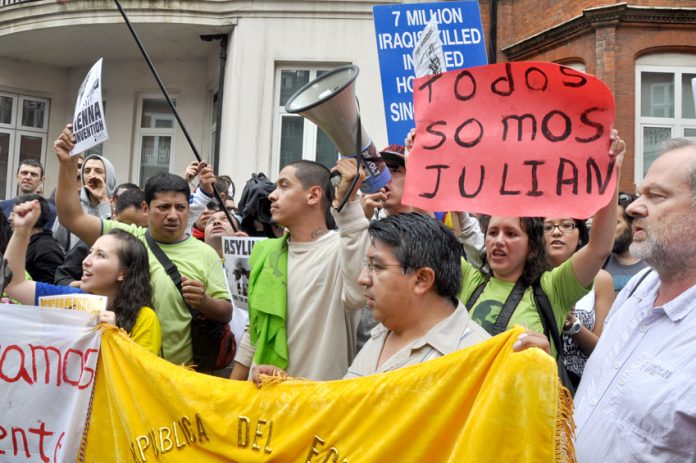
UK intelligence has been forced to reveal secret policy for mass surveillance of residents’ Facebook and Google use, says Amnesty International.
Amnesty is one of a group of rights organisations that are demanding Britain’s top counter-terrorism official must reveal a secret government policy justifying the mass surveillance of every Facebook, Twitter, Youtube and Google user in the UK.
The organisations published the policy, described in a written statement by Charles Farr, Director General of the Office for Security and Counter Terrorism, after they brought a legal challenge against the UK government.
The document reveals that UK intelligence agency GCHQ (Government Communications Headquarters) believes it is entitled to indiscriminately intercept web searches by British residents or communications between British residents.
‘British citizens will be alarmed to see their government justifying industrial-scale intrusion into their communications,’ said Michael Bochenek, Amnesty International’s Senior Director for Law and Policy.
‘The public should demand an end to this wholesale violation of their right to privacy.’
The government’s approach, which had to date not been made explicitly clear, defines almost all communications via Facebook and other social networking sites, as well as all web searches via Google, to be ‘external communications’ because they use web-based ‘platforms’ based in the USA.
The distinction between ‘internal’ and ‘external’ communications is crucial.
Under the Regulation of Investigatory Powers Act (RIPA), which regulates the surveillance powers of public bodies, ‘internal’ communications may only be intercepted under a specific warrant.
These warrants should only be granted where there is some suspicion of unlawful activity. However, an individual’s ‘external communications’ may be intercepted indiscriminately, even where there are no grounds to suspect any wrongdoing.
‘The security services consider that they’re entitled to read, listen and analyse all our communications on Facebook, Google and other US-based platforms,’ said James Welch, Legal Director of Liberty.
‘If there was any remaining doubt that UK snooping laws need a radical overhaul there should be no longer. The agencies are operating in a legal and ethical vacuum; why the deafening silence from our elected representatives?’
By defining the use of Google, Facebook, Twitter and other social media as ‘external communications’, British residents are being deprived of essential safeguards. But the government’s approach may also give room for GCHQ to intercept all communications in and out of the UK.
The documents suggest that:
• GCHQ is intercepting all communications – emails, text messages and communications sent by ‘platforms’ such as Facebook and Google – before determining whether they fall into the ‘internal’ or ‘external’ categories;
• The government considers that almost all Facebook and other social media communications and Google searches will always fall within the ‘external’ category, even when such communications are between two people in the UK;
• Classifying communications as ‘external’ allows the government to search through, read, listen to and look at each of them.
The key restriction on what they do with communications that they classify as ‘external’ is that they cannot search through such communications using keywords or terms that mention a specific British person or residence;
• Even though the government is conducting mass surveillance – intercepting and scanning through all communications in order to work out whether they are internal or external – they consider that such interception ‘has less importance’ than whether a person actually reads the communication, which is where the government believes ‘the substantive interference with privacy arises’;
• The government believes that, even when privacy violations happen, it is not an ‘active intrusion’ because the analyst reading or listening to an individual’s communication will inevitably forget about it anyway.
The document’s publication follows revelations made by whistleblower Edward Snowden about the UK’s global digital surveillance activities.
It was obtained by rights groups Privacy International, Liberty, Amnesty International, the American Civil Liberties Union and Pakistani organisation Bytes for All.
Obtaining the document forms part of an ongoing lawsuit seeking to establish the extent to which the UK government has been monitoring their online activity.
Charles Farr is the government’s key witness in the case, which will be heard by the Investigatory Powers Tribunal between 14 and 18 July 2014.
Farr’s analysis is the first time the government has openly commented on how it can use the vague legal framework provided by RIPA to scoop up posts and tweets through its mass surveillance programme, TEMPORA.
His justification of mass surveillance and his explanation of the secret GCHQ policy is framed as a hypothetical justification of hypothetical activities.
Despite the large volume of information and documents revealed by Edward Snowden, the government continues to maintain its policy to ‘neither confirm nor deny’ the activities he has revealed.
Among the documents leaked by Edward Snowden is GCHQ legal advice in which its lawyers lauded the UK government’s ‘light oversight regime compared with the US’.
Eric King, Deputy Director of Privacy International, said: ‘Intelligence agencies cannot be considered accountable to Parliament and to the public they serve when their actions are obfuscated through secret interpretations of Byzantine laws.
‘Moreover, the suggestion that violations of the right to privacy are meaningless if the violator subsequently forgets about it, not only offends the fundamental, inalienable nature of human rights, but patronises the British people, who will not accept such a meagre excuse for the loss of their civil liberties.’